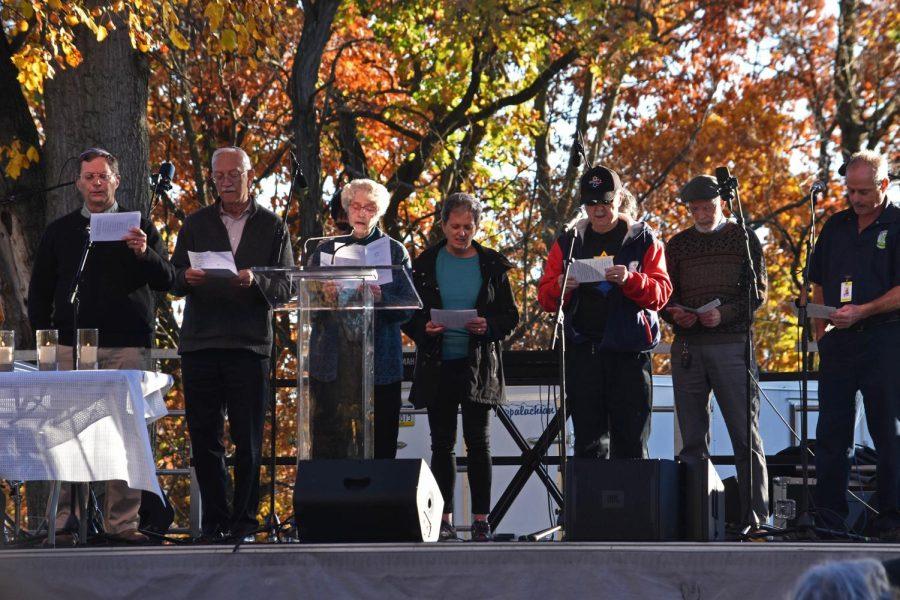Editorial | Pittsburgh’s Jewish community is still healing
Amaya Lobato | Staff Photographer
Community members mourn the lives lost in the Tree of Life shooting during a ceremony in Schenley Park on Thursday afternoon.
October 28, 2022
Pittsburgh is “stronger than hate,” but our Jewish neighbors still need support and solidarity — something we are reminded of more than ever on the four-year commemoration of the Tree of Life massacre.
On Oct. 27, 2018, Pittsburgh experienced the deadliest attack against the Jewish community in American history. The Tree of Life massacre took the lives of 11 and injured six Jewish worshippers at the Dor Hadash, New Light and Tree of Life — Or L’Simcha congregations, which all share the Tree of Life building. The synagogue is located on Wilkins Avenue in Pittsburgh’s Squirrel Hill neighborhood, which is home to the city’s largest population of Jewish people.
In the wake of the attack, 10.27 Healing Partnership was born in order to heal and reinvigorate a resilient, thriving Jewish community.
The 10.27 Healing Partnership is a Pittsburgh-based organization, located at the Jewish Community Center in Squirrel Hill, that aims to “[foster] a sense of community well-being by providing opportunities for reflection, support and connection for individuals and their loved ones impacted by the October 2018 attack and others who experience hate-induced trauma.” Repair the World Pittsburgh aims to mobilize young Jewish people to serve and engage in nonprofit work, as well as works to bridge lines of division.
Both organizations joined forces and organized volunteer events and commemorative services for October and November of this year. Their next events are on Oct. 30 and Nov. 6. Each act of service was carefully selected, each reflecting a cause or ideal close to those who died during the massacre.
As a wider demonstration of support for Jewish people and to honor those killed, a HBOMax documentary “A Tree of Life: The Pittsburgh Synagogue Shooting” released Wednesday. The Pitt News Editorial Board has not reviewed the documentary, but it is described in a Hollywood Reporter review as “focusing on intimate firsthand accounts over hard-nosed analysis or shocking new details, it brings forth the humanity of those impacted by the incident, refusing to let them be reduced to statistics or defined by tragedy.” Speaker of the House Nancy Pelosi also released a statement on Thursday where she asserted that the fourth-year commemoration “highlights our collective obligation to condemn and reject antisemitism in all its forms.”
The acts and acknowledgments from local and national actors comes at a critical time, considering antisemitism is making recent waves in media and communities. A 2019 Anti-Defamation League index — which asks people if they agree with a series of negative stereotypes about Jewish people — categorized 11% of the American population as “antisemitic.”
“American Jews are now forced to deal with the kind of brutality that originally drove many of their families to the United States,” wrote The Washington Post in 2018, following the attack. “Should Jews be an outward-facing community — or more inward-looking? These debates have characterized Jewish religious life since the Holocaust …”
And these debates even continue to follow Jewish Pittsburghers as antisemitism rises everywhere.
In April of this year, a hate group known as GDL passed out flyers with antisemitic and white supremacist remarks to approximately 20 homes in Squirrel Hill. This is apparently the group’s first known activity in the area. But on a national stage, the threat of antisemitism follows Jewish people across the country at levels not seen since at least the 1970s. This is especially true with prominent figures like Ye, more commonly known as Kanye West, and former president Donald Trump spreading their antisemitic views on international platforms.
For those of us who want a tolerable and equitable world, we hope that through solidarity and activism we can create a better world for everyone, regardless of race, age, ethnicity, religion and so forth. Four years after the Tree of Life, it is crucial to stand with Jewish people everywhere and condemn antisemitism.
May we continue to commemorate and honor the memories of those killed in the Tree of Life massacre — Rose Mallinger, Jerry Rabinowitz, Cecil and David Rosenthal, Daniel Stein, Richard Gottfried, Joyce Fienberg, Bernice and Sylvan Simon, Melvin Wax and Irving Younger.
Editor’s Note: This article originally said Repair the World Pittsburgh was founded after the Tree of Life massacre. It was founded in 2013. The Pitt News regrets this error.



